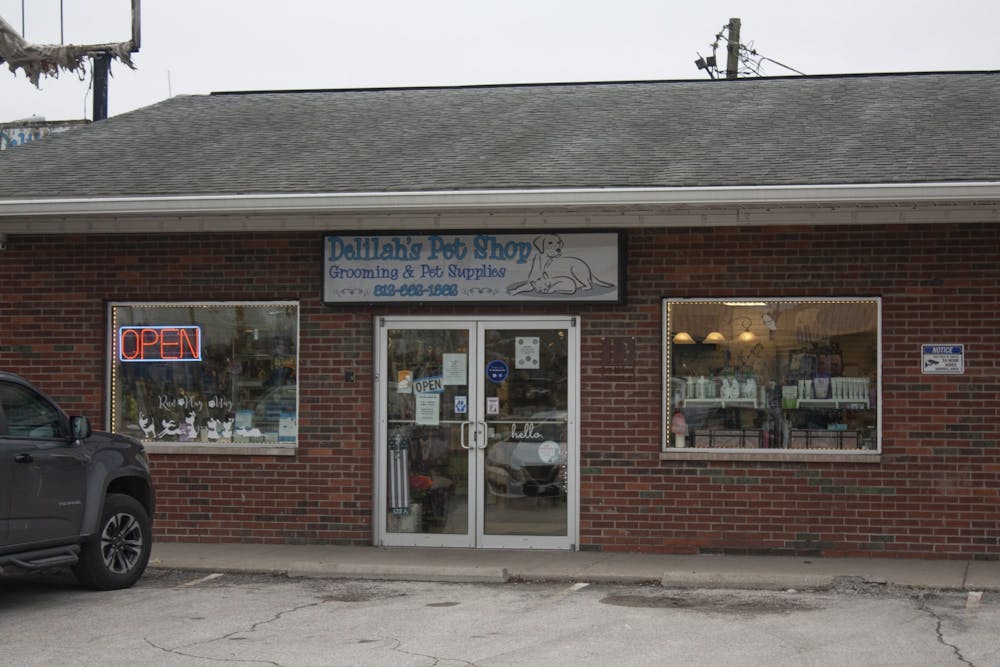For 40 years, Delilah’s Pet Shop has provided pets for the Bloomington community. But on Jan. 1, a city ordinance banning the retail sale of cats and dogs took effect, forcing the store to adapt.
“It’s so quiet now,” owner Lesli Henderson-Miller said. “Before, we could hear the sounds of people laughing, the sounds of dogs barking.”
The shop, named after the family Saint Bernard Delilah, was started by Henderson-Miller's mother, Karene Kidwell, who was a veterinarian technician. Henderson-Miller teared up as she talked about her mother’s death, which happened just last year.
“It’s been a hard year,” she said.
In an 8–0 vote in December 2021, the Bloomington City Council passed the ordinance in response to concern about puppy mills, which are large dog-breeding facilities that breed for profit, regardless of how the animals are treated.
Henderson-Miller said only one member of the city council visited her shop while the ordinance was being decided. She recalls the member saying the shop was nothing like what they were trying to stop.
“What we do here is we love our animals,” Henderson-Miller said. “It’s a soul. It’s a little person. It should be treated as a person.”
Henderson-Miller understands the council had good intentions but thinks that the ban was unfair to shops that weren’t doing anything wrong.
“This is my whole life,” she said.
Opponents of the retail sale of pets are mostly concerned about where the pets are sourced. Virgil Sauder, director of City of Bloomington Animal Care and Control, said some breeders do not ensure pets come from healthy genetics and sometimes separate puppies too young, causing health and behavioral problems.
The other option for sourcing is a broker system, where people buy animals from puppy mills and resell them online or to pet stores. Sauder said places like these often place animals in small cages filled with feces, urine and litter.
“They’re basically factory farming puppies,” he said.
But getting pets from ethical breeders can be beneficial for those who want young puppies or are interested in knowing the parents of the pet, Sauder said.
While the push to ban the sale of pets in stores has reduced the number of pets in mills nationally, some Indiana legislators are looking to pass a law that would allow stores to sell pets from USDA-licensed breeders. Filed in both the House of Representatives and Senate, these bills would make local ordinances, like the one in Bloomington, unenforceable.
Samantha Morton, the Indiana state director for the Humane Society of the United States, said that USDA certification doesn’t mean breeding practices are ethical. According to the Humane Society of the United States, USDA-licensed breeders that violate the Animal Welfare Act are rarely fined and are easily able to renew their licenses.
Morton said the organization is working to stop the Indiana legislation. She said that 32,000 fewer breeding dogs are caged in licensed facilities compared to ten years ago, which she believes is due to legislation causing a decline in retail pet sales.
Morton said pet stores may not be getting pets ethically even if they don’t source from puppy mills.
“Responsible breeders want to meet the family that’s coming to buy the dog,” she said.
Henderson-Miller says she got her pets from local breeders and emphasized the commitment involved in pet ownership to prospective buyers. She said being a small business owner is making it difficult to compete with large businesses that have also stopped selling pets, like PetSmart or PetCo, because she cannot buy store items in bulk.
“It’s such a fast-paced world that it’s just really easy to sweep someone under the carpet if you can,” she said. “But when you destroy somebody’s life, like what it’s beginning to do, that hurts.”
Although the state of the retail sale of pets remains uncertain, Henderson-Miller is adapting to the ordinance by offering grooming services and selling an array of pet food, toys and accessories.
In a room of wooden pens that used to hold puppies and kittens, all that remains are a few rescues and favors for friends. The pens with pets are marked with notes that read “NOT FOR SALE.”



